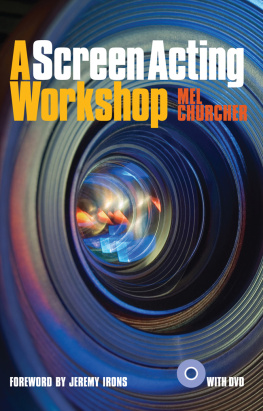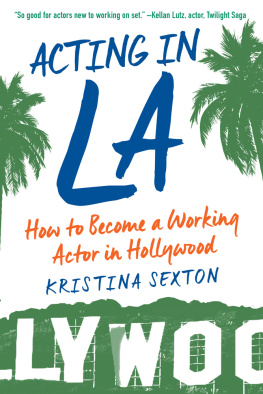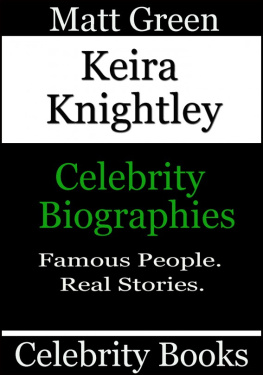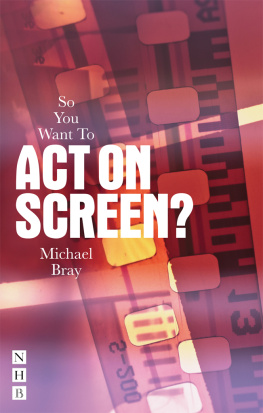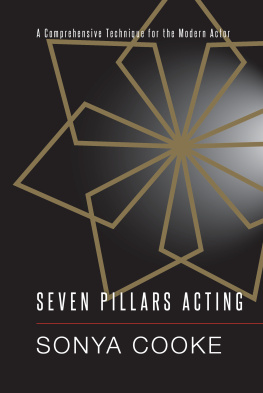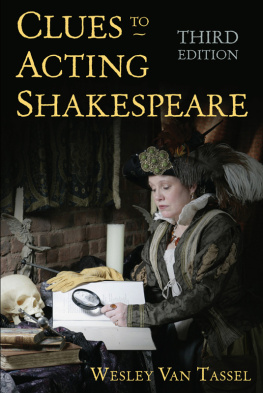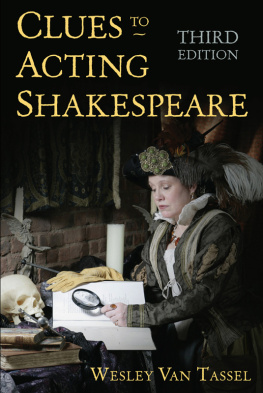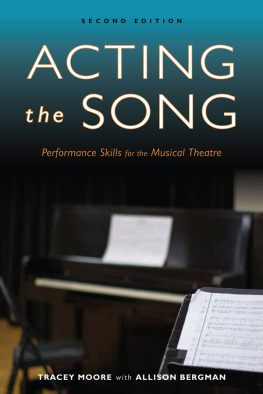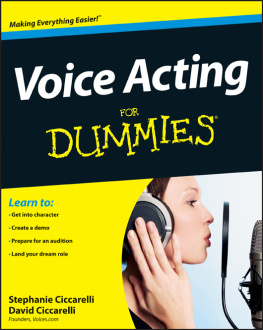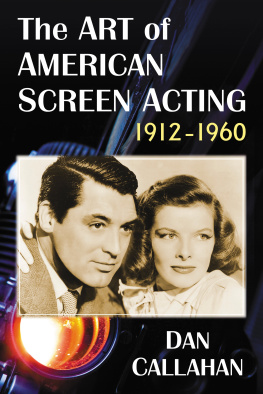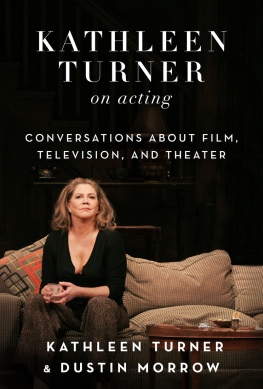
Foreword by Jeremy Irons

NICK HERN BOOKS
London
www.nickhernbooks.co.uk
To Chris and Ben
Contents
Foreword
Film acting has traditionally, in the UK at least, been rather looked down on as being something that the Americans do and which really doesnt need the technique of a theatre actor. In England, were mainly theatre actors, and film actors have been historically regarded as overpaid and under-talented.
But in reality, film acting can give you a real insight into acting in the theatre, because you cant lie on film whereas you can get away with lying in theatre. In other words, the camera will see you if you are pretending. You have to be. Now, I believe you have to be in the theatre also. You have to have a technique to enlarge that state of being so that an audience, whether its two hundred or two thousand, can understand what youre saying and what youre thinking and what youre feeling. And you have to be able to transmit that. But in order to do that honestly, you have to be able to be in that moment with no pretence. And if you come to film and think that you can pretend in front of the camera (which you can get away with on stage, and which you see a lot of actors doing) it doesnt work.
In life, we recognise the difference between someone pretending to be angry and someone being angry. We can tell whether they really find something funny or if theyre pretending to find something funny. So, if we pretend on stage, a perceptive audience can sometimes tell. Well they can always tell on camera.
So I think film is a real testing ground for actors. You have to find ways to get, very quickly, into your role to learn the techniques that you need when youre going to shoot, probably, in short little bites. You have to understand what the scenes about and what the arc of the scene is, as you would in theatre, but then you have to be able to get immediately into the right bit of that arc for the particular shot thats being done. These days, people tend to shoot longer takes, shoot wide and use multiple cameras, so things are easier than they were. But youve still got to have tricks to make sure that very fast youre ready. You dont want directors to have to do more than two or three takes. The old days of fourteen or fifteen takes are over.
The misunderstanding arises, I think, from people assuming film and television acting is no more than being real. Hopefully you will seem to be, but you are being someone else in a different situation. You have to get yourself into that situation. Now some work doesnt require very much. Some work requires much more, requires you have to make a huge leap into maybe a different century or to a personality thats completely different to you, the actor. I think great acting should be seamless. It shouldnt show. Its a god-given talent that some people have. I watch the great actors and try to learn from them.
Training is important. I think its useful to get used to the situation on set to get used to dealing with the pressure. People will say so often, Real people are so much moreinteresting than actors lets have a real person playing that role. And so you bring in a real person and you put the lights on them, turn on the camera, and they just collapse with nerves. What you have to do, as an actor, is to be used to all that tension and the time pressure, and learn not to worry about it.
Keep your own space. Know the jewel that you carry what you have to offer, that no one else can do. Make sure you are in a completely calm space that is the right space for that moment in the scene. So that you dont see the camera, you dont see the lights, you dont see the technicians watching. Thats clearly very important, and you will learn to do that with practice and training.
You have to allow the lens into you. You have to be open to it but not play for it. Its an attitude. When I say Keep your own space, its about making the space to allow us to see what youre thinking, see what youre going through. Because storytelling is what we do in a film sharing experience, sharing emotion. And people who put things out to you tend to make you, as an audience, pull back
Ive always thought that making a character is like making an advent calendar. In each scene, you open a window and you just show a bit of life inside that particular room from that angle, and then the next scene you open another window
But invite us in. Dont feel you have to justify yourself or show yourself. You dont. Just intrigue us
Jeremy Irons
Acknowledgements
I am deeply indebted to all my teachers and directors as an actor, and all my actors and colleagues as a teacher and director with special mention to friends at the BritishVoice Association; to Cicely Berry, who is always my mentor; to Tim Reynolds, who gave me my first chance to direct; and to Luc Besson, who has provided me with some of my most exciting film projects.
A special thank-you to all the actors who bravely allowed me to use their private rehearsal work on the DVD and film clips, and to all the actors whose work it would have been wonderful to use if space had permitted.
Thank you to my publisher Nick Hern and to my editor Matt Applewhite for their tireless support and encouragement.
Thank you so much to Jeremy Irons for his clear and thoughtful Foreword.
Thanks to the Actors Centre (www.actorscentre.co.uk) and my colleagues there for all their help and assistance: Matthew Lloyd, Michael John, Diane Shorthouse, my long-sufferingfilm editor Daniele Mercanti (who also devised the complex navigation system for the DVD and uploaded all the film clips online), and DOP Ivan Dalmedo.
Thanks to Holger Borggrefe, Johanna Schenkel, DOP Andreas Kohler and sound mixer Gerd Ide Ldige and all my colleagues at ifs international film school Cologne (www.filmschule.de).
Thanks to Interkunst e.V. in Berlin (www.interkunst.de) and my colleagues there: Til Dellers, Arkadiusz Zietek and DOP Matthias Kremer.
Thanks to Penelope Cherns at LAMDA and DOPs Alvin Leong and Nayla El-Solh.
Thanks to Amanda Brennan and Catherine Alexander at Central School of Speech and Drama and DOP Keir Burrows.
Thanks to Drew Stocker at Alleyns School for providing the means for a workshop and to Ben C. Roose for organising it.
Thank you to sound mixer John Rodda and his kind colleagues for providing me with real studio sound effects.
Thank you to actors Daniela Holtz and John Keogh for permission to use extracts from their e-mails.
Thank you to Kevin MacLeod (www.incompetech.com) for the use of his music as credited on the DVD and films clips, and to Kirsty Mather for the use of her song.
Last, but always first, love and thanks to Chris and Ben Roose.
Mel Churcher
The author and publisher also gratefully acknowledge permission to quote from the following, in the book and on the DVD and film clips:
China is Near by Marco Bellocchio, translated by Judith Green (copyright 1969 Grossman Publishers, Inc.), published by Calder and Boyars (Publishers) Ltd; Playing by Heart by Willard Carroll, by kind permission of the author; Savage in Limbo by John Patrick Shanley, published by Dramatists Play Service, Inc.; Junebug by Angus MacLachlan, by kind permission of Epoch Films; Girl, Interrupted by James Mangold,

